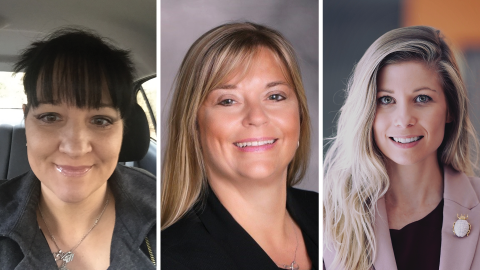
In the wake of the current pandemic, administrative team members had to quickly shift gears to a virtual work environment to ensure the safety of patients and frontline workers. The shift has greatly impacted the Program Coordinators and administrative staff of the Section’s education programs, who now are organizing some of the programs’ most important events of the year from afar.
From communicating national workshop and event cancellations to developing plans for virtual interviews, the program coordinators have shown resilience in continuing the education programs for our current and prospective trainees, residents, and fellows in Surgery.
Below are stories from three members who share their perspective on the impact of COVID-19 and the innovation required to keep the Section’s education programs running smoothly during this time.
Rita Chambers, Senior Program Coordinator
Virtual Fellowship Interviews
“Before the virtual concept had transpired, we were preparing for 1:1 in-person interviews for 15 interview days. When COVID-19 hit, we were able to conduct one in-person interview, and then had 8 days to develop a plan for virtual interviews with either Duke WebEx or Duke Zoom. Pulling together a schedule and understanding how to conduct a virtual interview was extremely new and unknown.
I developed a very detailed packet for the faculty members with the agenda, matrix, evaluation sheet for each applicant, and the applicant’s complete profile with picture. Communication to all faculty, assistants, fellows, and my supervisor on what to expect for the day was crucial. My biggest interview day was coming; we actually had numerous program meetings to make sure that the day was going to be conducted in a professional manner and that the applicants will get the benefit of our program even though they are not here physically. Once the interview day came, we were ready and thankfully it ended with no major issues. Applicants expressed their gratitude on how this was the smoothest virtual interview they have had so far. Our team has also gotten a more positive outlook from this saying that we can overcome anything because we are Duke.”
Colleen McDowell, GME Program Coordinator
National Collaboration on Plastic Residency Education
“At the onset of the recent stay at home order, the Plastic Surgery Education Team thought it was imperative to immediately continue didactics with the residents. The group wanted to ensure that the education of the residents stayed on point and uninterrupted during this unprecedented time. With Dr. Jeffrey Marcus at the helm team continued to invite nationally recognized visiting professors and leaders to speak at the Duke Plastic Surgery Weekly Grand Rounds.
Although the division had collaborated with Duke’s North Carolina neighboring plastic surgery programs in the past, the virtual lectures were a great opportunity to branch out nationally to other programs as well. Each week, more programs worked in partnership and joined forces to hear national leaders from across the nation. Duke Plastic Surgery’s own faculty reciprocated and spoke virtually for other plastic surgery programs. Nationally, the virtual visiting professor program for plastic surgery took off.
The division would like to continue to incorporate virtual lectures into the visiting professor program, not necessarily to replace the personal touch of in-person visiting professor visits, but to certainly enhance the program and the overall academics. This innovated and collegial partnership has not only brought Duke and the Duke Plastic Surgery Program national recognition, but it has also heightened the educational endeavors and team collaboration which is directly in line with the program’s mission and vision statement.”
Danielle King, CMP, Program Director, Continuing Medical Education
Virtual CME Program Challenges
“As providers of continuing education, it's imperative that we adopt the growth mindset of lifelong learning to find purpose in our profession and to advance our knowledge and develop new skills that align with Duke Surgery’s mission to provide superior education and training for our faculty and trainees, and to establish thought leadership among our peer institutions. This is our ethos in normal times, and, in a time of crisis, a directive. We’ve experienced a major disruption in our profession as meeting planners and facilitators of local, regional, and national live conferences, workshops, research symposia, and networking events. Part of our responsibility is to provide a safe learning environment, and at the start of the pandemic, we had to make difficult decisions quickly with limited information in order to protect our faculty, staff, attendees, and vendors.
While some of our live activities necessitated cancellation, many are proving to be effective in a virtual space while offering flexibility under time and budget constraints, attracting a broader audience, maintaining relevance among our peer institutions, and building momentum for our live events in the future.
I’m inspired by the adaptability, resilience, and innovation of our continuing education team. We’ve chosen to react to this disruption with a growth mindset, learning and applying new technology, pivoting instead of stopping, and evaluating our progress along the way to emerge more knowledgeable and capable than before.”